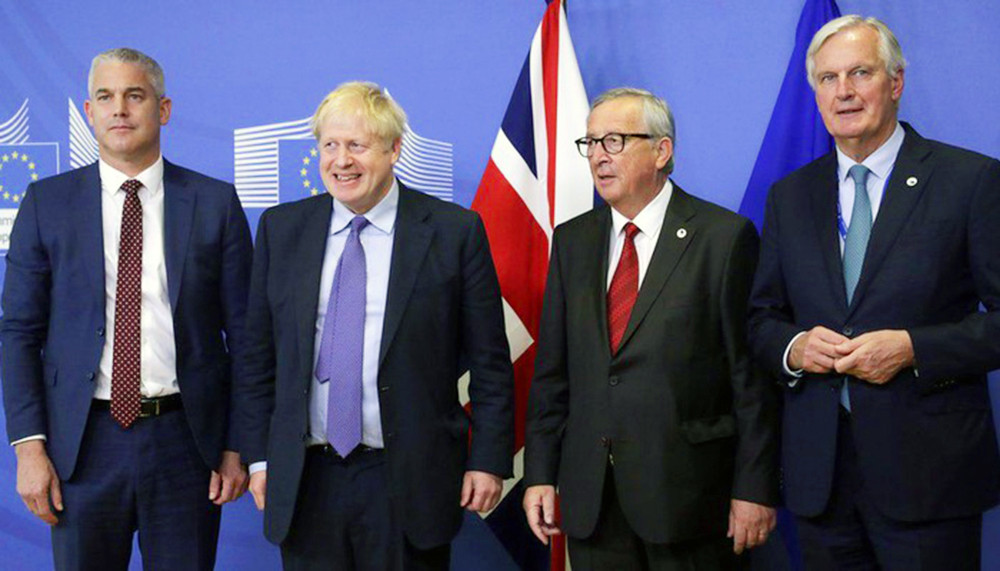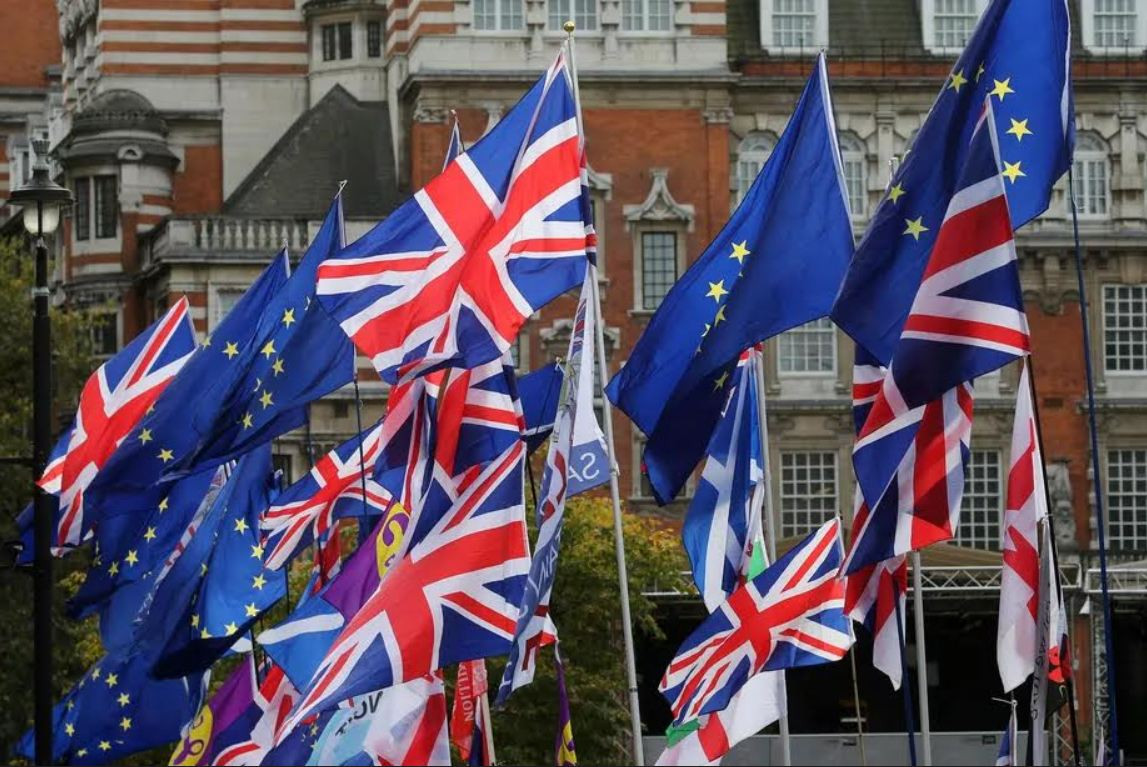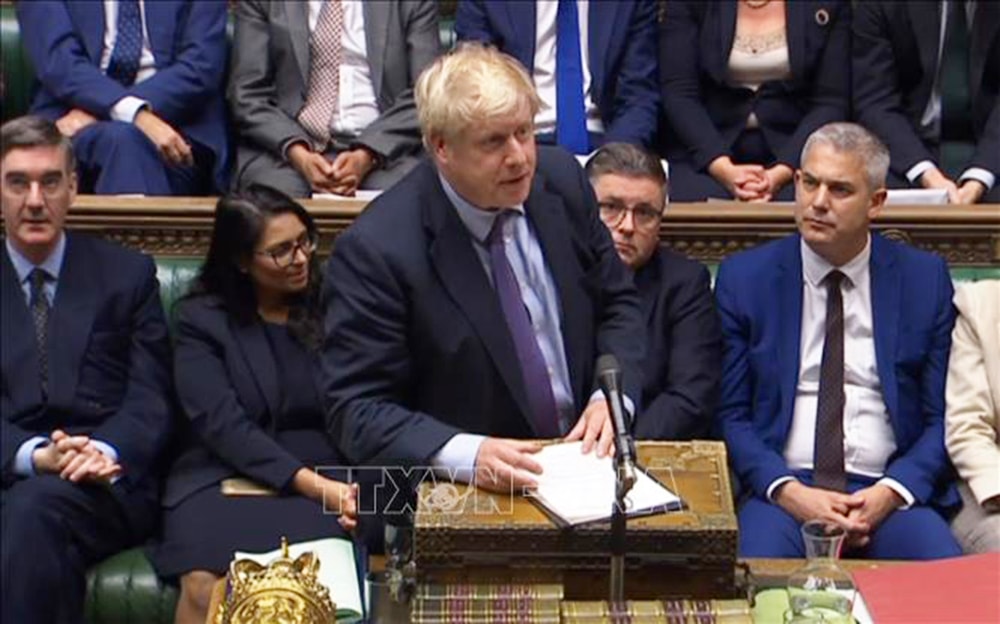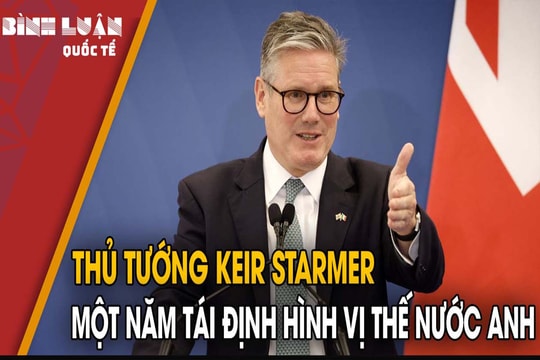Brexit: New deadline, new problems
(Baonghean) - Brexit has just been "nodded" to be extended once again by the EU, with the reluctant approval of British leader Boris Johnson. The boss of No. 10 Downing Street is trying to pass a bill allowing for an election next December, so that he can increase his strength and support his own version of Brexit.
Third extension
Thus, European Council President Donald Tusk spoke out earlier this week to confirm that European Union (EU) leaders agreed with the UK's request to "flexibly extend" Brexit until the end of January 2020. This move also gives the foggy country the option to leave the EU earlier, on December 1 or January 1, 2020, if the British Parliament can ratify the new Brexit deal.
 |
| British Prime Minister Boris Johnson (second from left) and European Commission President Jean-Claude Juncker (second from right) in Brussels on October 17. Photo: EPA |
Although British Prime Minister Boris Johnson has affirmed that he will take Britain out of the EU on October 31 at all costs, up to now, the foggy country has accepted the proposal to delay the "divorce" with the EU. Johnson is forced to follow the law, that he is forced to ask the EU to delay, even if it goes against his personal wishes, and at the same time, if faced with the proposal to extend until the end of January next year, he must also nod in agreement.
With this development, Brexit is about to be postponed for the third time since the British people voted to “leave”, and this is disappointing news for many people. The EU wants to avoid being “named” if there is a no-deal Brexit, which is costly and accompanied by disruption to trade and the economy, so it is not surprising that they agree to a delay.
Brexit rules that Britain needs to implement before leaving the EU were pushed forward last week, even though British lawmakers rejected a timeframe pushed forward by Mr Johnson by three days.
The British Prime Minister proposed holding an early election in early December, but the British Parliament rejected this effort on October 28. 299 MPs voted in favor of holding the election, while 70 opposed, and many MPs abstained, meaning they did not reach the required two-thirds majority.
 |
| Pro-Brexit protest on October 28. Photo: AFP |
Will you hold a general election?
Immediately after the results were announced, Johnson announced that his government would introduce a short bill calling for an election on December 12. It is clear that this leader wants to take advantage of the extra time to try to hold a general election, which he argues will break the parliamentary deadlock on Brexit, as well as give him the opportunity to regain a majority in Parliament to be able to carry out Brexit in Johnson's "version".
The bill would require a simple majority, rather than the statutory two-thirds majority, and would effectively override current electoral law. The question is whether Parliament can “reconcile” with Mr Johnson’s plan. Mr Johnson has twice tried to call an election, but opposition parties have resisted. Some say they simply want to wait until Mr Johnson is forced to ask for an extension, thus betraying his promise that he would rather die than ask for a delay.
 |
| British Prime Minister Boris Johnson (front) speaks at a session of the House of Commons in London, Britain on October 22, 2019. Photo: THX/TTXVN |
But now, even with a delay certain, Johnson's plans for a December election are in doubt.
The main opposition Labour Party says the election is risky, as Mr Johnson’s party remains more popular, and so far there has been no sign that Johnson’s broken Brexit promises will backfire on him.
The election pressure is clearly on Labour. They got the Brexit extension they wanted. They are a minority, and not a majority in Parliament. That’s not to mention other opposition parties that are now looking forward to an election, including the Scottish National Party and the Liberal Democrats. The Liberal Democrats in particular have gained support for their anti-Brexit stance, and they want an election now so they can have a platform to prevent a UK-EU divorce.
 |
| Brexit has been delayed for a third time. Photo: Getty |
Sharing a similar view, CNN analyzed that the British Prime Minister's approach faces two problems: Johnson does not have a majority in the House of Commons, as he fired 21 MPs after they voted against him in early September, while others have resigned. Another problem is that, like any other regulation in Parliament, the bill can be amended, Johnson may face the risk of the opposition joining forces with opponents in the Conservative Party to change the bill in a way that could harm him.
For now, the Brexit “flexibility extension” seems to be a foregone conclusion. But in the coming months, it will be up to the British Parliament to decide, and the public will be watching closely to see whether MPs will use this opportunity to actually debate and pass Brexit, or focus on what promises to be a tense election campaign, centered around Brexit.




